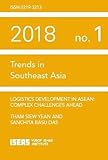Logistics Development in ASEAN : Complex Challenges Ahead / Siew Yean Tham, Sanchita Basu Das.
Material type: TextPublisher: Singapore : ISEAS Publishing, [2018]Copyright date: ©2018Description: 1 online resource (36 p.)Content type:
TextPublisher: Singapore : ISEAS Publishing, [2018]Copyright date: ©2018Description: 1 online resource (36 p.)Content type: - 9789814818070
- 9789814818087
- 658.7/2 23
- HD38.5 .T43 2018
- online - DeGruyter
- Issued also in print.
| Item type | Current library | Call number | URL | Status | Notes | Barcode | |
|---|---|---|---|---|---|---|---|
 eBook
eBook
|
Biblioteca "Angelicum" Pont. Univ. S.Tommaso d'Aquino Nuvola online | online - DeGruyter (Browse shelf(Opens below)) | Online access | Not for loan (Accesso limitato) | Accesso per gli utenti autorizzati / Access for authorized users | (dgr)9789814818087 |
Browsing Biblioteca "Angelicum" Pont. Univ. S.Tommaso d'Aquino shelves, Shelving location: Nuvola online Close shelf browser (Hides shelf browser)

|

|

|

|

|

|

|
||
| online - DeGruyter Parties in the Periphery : Organizational Dilemmas in Indonesia's Kepri Province / | online - DeGruyter Malaysia's Bumiputera Preferential Regime and Transformation Agenda : Modified Programmes, Unchanged System / | online - DeGruyter Legislation on Underwater Cultural Heritage in Southeast Asia : Evolution and Outcomes / | online - DeGruyter Logistics Development in ASEAN : Complex Challenges Ahead / | online - DeGruyter Parti Pribumi Bersatu Malaysia in Johor : New Party, Big Responsibility / | online - DeGruyter "We Love Mr King" : Malay Muslims of Southern Thailand in the Wake of the Unrest / | online - DeGruyter Vietnam's Foreign Policy under Doi Moi / |
Frontmatter -- FOREWORD -- EXECUTIVE SUMMARY -- 1. INTRODUCTION -- 2. KEY DRIVERS OF ASEAN'S LOGISTICS SECTOR -- 3. LOGISTICS DEVELOPMENT IN ASEAN-10 -- 4. FDI LIBERALIZATION AND FACILITATION IN ASEAN INTEGRATION -- 5. CONCLUSION
restricted access online access with authorization star
http://purl.org/coar/access_right/c_16ec
Growing urbanization, increasing trade and investment due to integration, and emerging new business models like e-commerce are accelerating the demand for efficient logistics in each ASEAN country. The logistics sector is inherently complex due to its scope, ranging from physical infrastructure covering four modes of transport, customs, and services. Each of these sub-sectors is regulated by different government agencies, leading to complex challenges in each country's logistics sector. Policymaking has a tendency to be done piecemeal rather than integratively, while a more or less fragmented governance structure impedes implementation. ASEAN liberalization commitments focusses on raising the cap on foreign equity, while regulatory reform remains untouched. Also, flexibility offered in these commitments allows for non-compliance. Going forward, developing seamless logistics requires ASEAN countries to first overcome their domestic challenges. Each country needs to develop comprehensive plans, and effective implementation of these is essential. Liberalization commitments should complement domestic reforms in each country.
Issued also in print.
Mode of access: Internet via World Wide Web.
In English.
Description based on online resource; title from PDF title page (publisher's Web site, viewed 30. Aug 2021)


